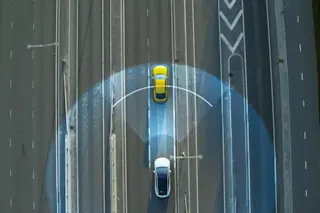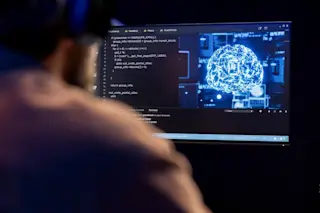http://youtu.be/kkKoMQwQ0yA Scientists may soon give your braking leg a break. In a recent study in the Journal of Neural Engineering, researchers at the Berlin Institute of Technology monitored the brain signals of drivers and found that they could detect the study participants' intent to stop before they actually stomped on the brakes. The findings could someday lead to automated braking technologies that help avoid devastating car crashes. In the study, the researchers had 18 participants drive along virtual roads in a racing simulator that includes winding streets and oncoming traffic—the drivers had to maintain a certain distance behind the computer-controlled cars in front of them, which braked at random intervals. While the participants drove, the researchers tracked their brain signals using caps fitted with EEG sensors. With the EEG data, the researchers saw when the drivers were going to brake a whole 13 hundredths of a second (or 130 milliseconds) before they did it. At 65 mph, this tiny difference in reaction time can reduce braking distance by 12 feet. "While this may not seem [like] much, it may be enough to prevent accidents," computer scientist and co-author Stefan Haufe told ABC News. The researchers are now planning to conduct road tests of this system (volunteers, anyone?). In the past, other scientists used EEG technology to develop prototypes of mind-controlled cars. And more recently, University of Maryland researchers created a "Brain Cap" to control robotic prosthetic limbs and such. As cool as this all sounds, the technology may have a ways to go before you can drive around with your own fancy EEG cap, lead researcher Benjamin Blankertz told BBC. The caps in the study were uncomfortable and took half an hour to put on (electrodes had to be attached to the participants' scalps), not to mention the fact that they only worked when participants kept their heads still. But it seems that we're inching towards that day. Have you seen the EEG golf visor? [via BBC]
Use Your Brain to Brake, Not Your Leg
Discover how automated braking technologies could leverage brain signals to anticipate drivers' intent to stop, enhancing road safety.
More on Discover
Stay Curious
SubscribeTo The Magazine
Save up to 40% off the cover price when you subscribe to Discover magazine.
Subscribe












